As a technology provider, we need to "place bets" on which 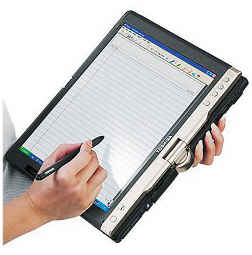 technologies our potential customers will most want to use, and today's post shares some of our strategic thinking in that regard. Today we look specifically at nurse's needs for clinical documentation in the home and what they'll most prefer to use. Our bet is on the tablet PC, and this post explains why...
technologies our potential customers will most want to use, and today's post shares some of our strategic thinking in that regard. Today we look specifically at nurse's needs for clinical documentation in the home and what they'll most prefer to use. Our bet is on the tablet PC, and this post explains why...
First let's look at the current state of clinical documentation in home care. The most popular solutions in use today are paper and laptops. Most nursing documentation originated as a piece of paper that would be filled out and placed in a folder. Then came the idea of the electronic medical record, an area where the certified nursing community is ahead of the industry thanks to the OASIS mandate, and the nurses and software vendors started placing their bets on how to get OASIS done efficiently and 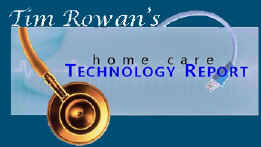 accurately (with all of the necessary cross checks needed to get Medicare reimbursement). Some vendors, like Select Data, offer solutions where the nurse gets to fill out the OASIS form on paper and then it gets scanned and errors are checked. There was a recent article in Home Care Technology Report about how this solution resulted in significant improvements (see the full article here). The benefit of this solution is that it's natural for the nurse to write his or her notes on paper while conducting a patient exam. One of the downsides, however, is that the nurse has to bring their paperwork to the office and then they might have to do error correction after the fact (because the scanning and error checking is done when they come in).
accurately (with all of the necessary cross checks needed to get Medicare reimbursement). Some vendors, like Select Data, offer solutions where the nurse gets to fill out the OASIS form on paper and then it gets scanned and errors are checked. There was a recent article in Home Care Technology Report about how this solution resulted in significant improvements (see the full article here). The benefit of this solution is that it's natural for the nurse to write his or her notes on paper while conducting a patient exam. One of the downsides, however, is that the nurse has to bring their paperwork to the office and then they might have to do error correction after the fact (because the scanning and error checking is done when they come in).
The predominant way that nurses do electronic documentation is on a laptop or netbook (see our previous post explaining netbooks here). These solutions have the benefit that they do error 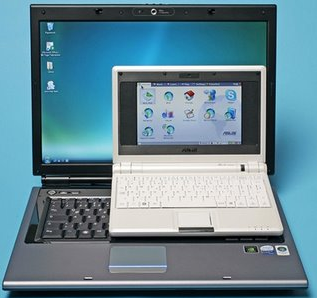 checking in real-time and that they work with or without Internet connectivity (if you're offline, your documentation will synchronize when you are back in coverage). One of the issues with laptops and netbooks, however, is that nurses generally don't like to type on a keyboard while they're interacting with the patient, so often they do their exam and then they document after the fact. Another issue is the weight and battery life of laptops. Other vendors, like Home Care Home Base have placed their bet on Personal Digital Assistant (PDA) technology where the device is like a telephone. This is popular because of the size and weight of the phone, but many nurses don't like the small screen and small font.
checking in real-time and that they work with or without Internet connectivity (if you're offline, your documentation will synchronize when you are back in coverage). One of the issues with laptops and netbooks, however, is that nurses generally don't like to type on a keyboard while they're interacting with the patient, so often they do their exam and then they document after the fact. Another issue is the weight and battery life of laptops. Other vendors, like Home Care Home Base have placed their bet on Personal Digital Assistant (PDA) technology where the device is like a telephone. This is popular because of the size and weight of the phone, but many nurses don't like the small screen and small font.
Based on this explanation of the current state, the case for tablet computers begins to emerge. A tablet has a screen that you can write on with a stylus or use a keyboard. There are two varieties of tablets, one looks like a regular laptop but let's you rotate the screen and write on it with your stylus. This let's you use it like a regular laptop or a tablet, but these devices are generally heavy and expensive. The other model gives you a "soft keyboard" where a full typewriter keyboard is on your screen, and depending on the way you orient your screen, you get a bigger or smaller keyboard (see the pictures below). Tablets aren't perfect either though... We've all signed our electronic signature on the credit card pad at the grocery store or Best Buy or Home Depot and will attest that our handwriting isn't as neat there as it is when we put pen to paper. But the big issue that has held tablets back is their cost, averaging $2,000 for a tablet compared to $650 for a nice laptop or $350 for a nice netbook.
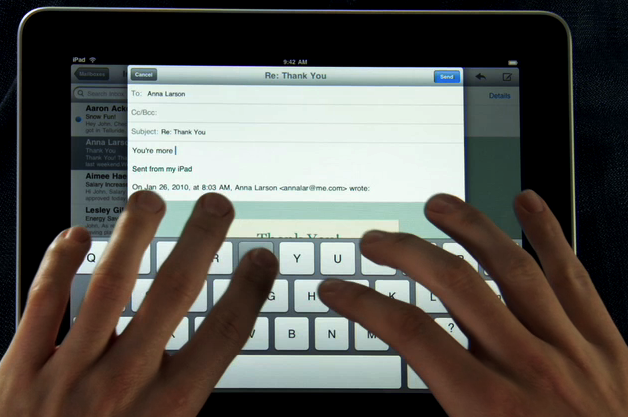
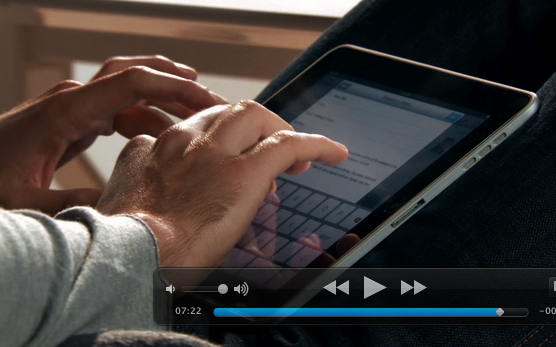
(iPad photos from www.apple.com)
So why are we betting on the tablet? This is thanks to our friends at Apple who brought us the iPod, the Mac and now the iPad. We don't think that the iPad (which will start to ship in March) is really ready for prime time, but by announcing iPads starting at $499, they've reset the price point for the industry. This article in last Thursday's Wall Street Journal explains that the PC makers are all scrambling to compete with the iPad and it is speculated that HP will be coming out with their HP Slate at a very competitive price (note that most people view the $499 iPad as not being capable enough and they're targeting to compete with the $629 model). To find the Wall Street Journal article, seach on "PC Makers Ready iPad Rivals"; you'll need a subscription to see the full article.
So in the end, we expect that the tablet computers like the iPad and the HP Slate will become more cost competitive and that this technology will take off. We also beleive that the capability to write in handwriting and have it converted to computerized text will become more popular when the prices become competitive (second half of 2010). For the future, we expect that the tablets will continue to get smaller and lighter, like the Amazon kindle.
Ankota provides software solutions focusing on home care delivery including a comprehensive software solution for Private Duty Care and adjunct software products such as telephony, advanced scheduling, mapping and family member communications software to complement the home care enterprise solutions (OASIS and Billing systems) referred to in this article. For more information, please visit http://www.ankota.com/ or contact us. If you like posts like this one, please see our Home Care Software Geek posts here.
.png)
.png)
.png)
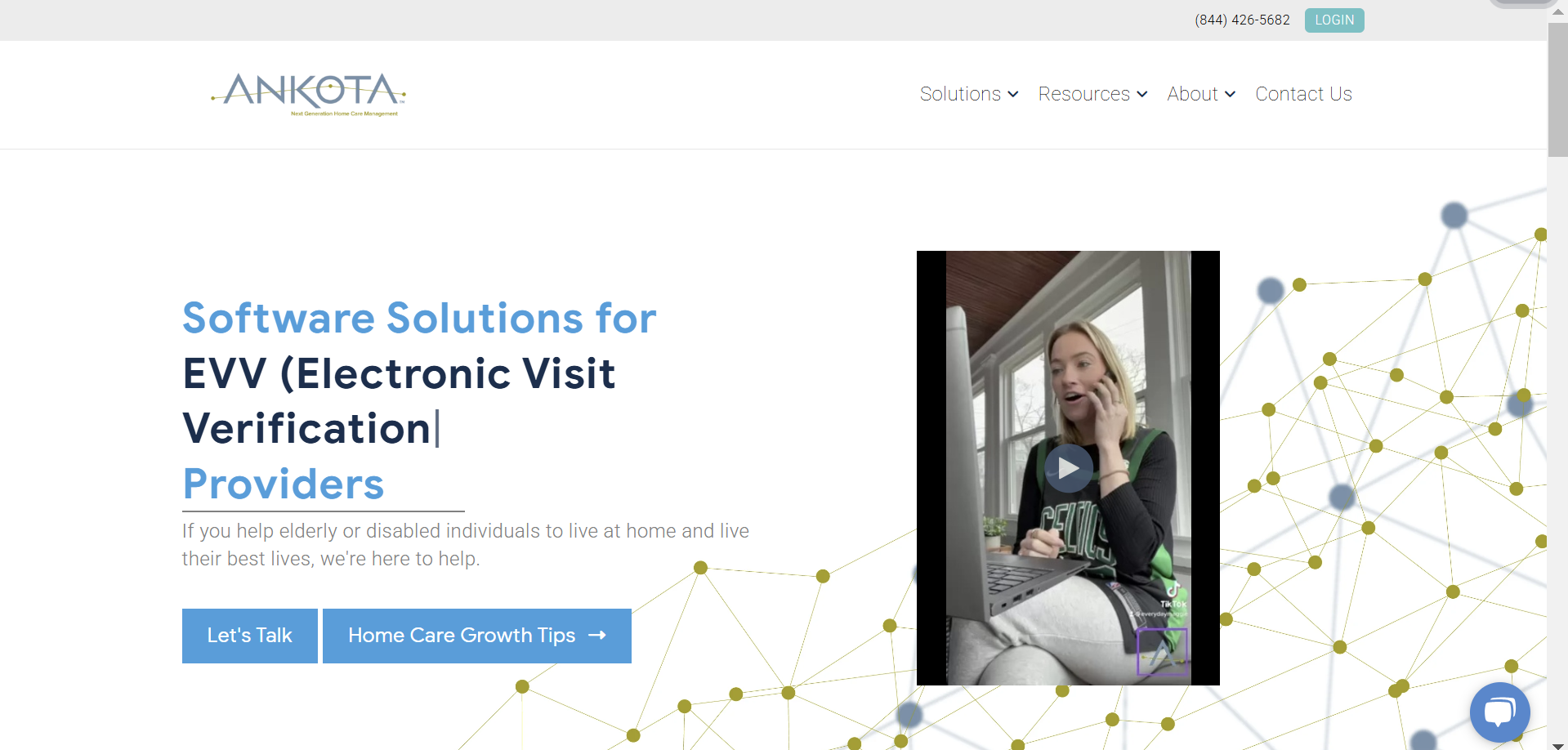

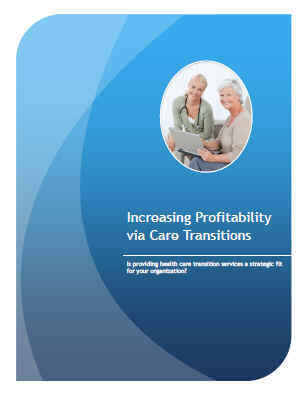
.png)
.png)
.png)


